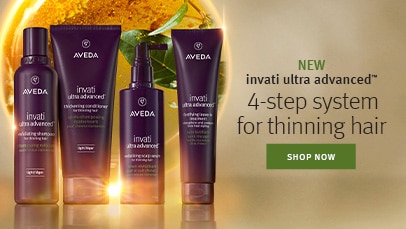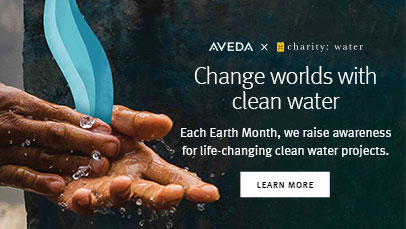Life Cycle
Product End of Life and Closing the Loop
Deb Darling, Director Packaging Materials and Innovations Initiatives, has spent over two decades at Aveda with a focus on materials research and innovation, developing new packaging design and revamping existing systems. Her long career at the company has led to many of Aveda’s sustainable packaging achievements. Developing containers and materials that meet the needs of the product, are sustainable, and lend themselves to optimal recycling require years of research, design, and testing. Deb shares some of the more recent developments in her area:
“During the last couple of years our focus has been on continuing to develop packaging-related life cycle strategies for Aveda. We’re pushing the industry forward on packaging innovation by exploring bio resins that will not contaminate existing recycling streams, continuing the use of high post-consumer recycled (PCR) content and reaching 100% PCR content for high-density polyethylene (HDPE) in our bottles.”
“Over the years we’ve worked with polymer resin suppliers who are willing to continually improve their processes and reduce contamination to PCR content, and who collaborate well with PCR molders to optimize results. Our suppliers are on the cutting edge of innovation and we help them strive for continual advancement. We frequently visit resin suppliers and recommend improvements in processes, which helps us recommend these resins to our molders. This approach is what makes Aveda unique: we form long-term, extended partnerships and are deeply involved in supply chain conversations.”
Folding Carton Innovation
“One of the exciting things we’ve worked on for the past four years is the first Forest Stewardship Council (FSC) certified high-end folding carton paperboard made from 100% post-consumer waste (PCW). The award winning JPP100 prestige folding carton board has a high luster and bright white printing surface. As a responsible brand within the prestige beauty sector, we needed to elevate product aesthetics while still meeting the Aveda Mission.”
“Our partners on the project Neenah Paper and Johnson Printing and Packaging saw great value in developing this never-before seen product and jumped at the chance to collaborate. After a lot of sampling and tests we launched the first carton with our Invati™ product line, followed by other high-end products, such as Hand Relief™ Night Renewal Serum and Aveda Love™ Composition Oil. We want to expand its use to other product lines and are now on our fourth version, in which we have been able to improve efficiencies and reduce cost. Aveda strives to encourage industry-wide change, and usually only maintains exclusivity on innovations for up to a year before asking partners such as Neenah Paper to expand their sales to our industry peers. “
“We’ve also partnered with R&D on a special initiative to develop natural ingredients in ink pigments for folding cartons and other packaging. One of these is the urukum pigment from the Yawanawa people of Brazil that we use in some of our beauty product formulas. This new product is still in the preliminary stages, but it is looking like a viable option for Aveda to use.”
Continuing Innovation in Post-Consumer Recycled Plastics and Bio-Plastics
“Aveda worked with KW Plastics to develop the first PCR polypropylene resin which is today used by many other companies. We are currently working on a PCR polypropylene flip-top hinge closure for our Enlightener™ Cream Booster package. We believe it will be the first commercialized hinged closure utilizing PCR polypropylene packaging product in our industry.”
“Going forward we’ve begun to use fossil fuel-free bio-plastics and have already launched, in partnership with Braskem, a green polyethylene plastic tube with our Dry Remedy™ products and several other product lines. Green polyethylene is manufactured from renewable sugarcane waste but has the same physical properties as fossil-fuel derived polyethylene and can be recycled in regular polyethylene recycling streams. We are keen to develop packaging products that are easily recycled in residential recycling programs.”
“The very successful FY 2016 launch of the Tulasāra™ product line, says a lot about the quality and great aesthetics we can achieve using environmentally friendly materials. PCR polyethylene was used in the brush handles, the jars are PCR PET, and the JPP100 prestige folding carton board was used in the secondary packaging.”
Innovations in Post-Consumer Recycled Glass
“Historically, post-consumer recycled glass tended to have a green tint with reduced clarity due to how it’s collected, cleaned and reprocessed. After years of collaboration with our supplier, we are the first in the industry to use 20% PCR content clear glass bottles without compromising aesthetics. We’re first launching PCR content clear glass in our 50 ml Composition Oil bottles.”
Cradle to Cradle Certifications
We continued our relationship with the EPEA (Environmental Protection Encouragement Agency) established in 1987 by Professor Dr. Michael Braungart, one of the founders of the Cradle to Cradle (C2C) movement. EPEA is a key advisor in our Mission Aligned Ingredient Review process and assesses Aveda’s applications for C2C product certifications, which are then issued by the Cradle to Cradle Products Innovation Institute.
In 2015, the Cradle to Cradle Standard was updated from Version 2.0 to Version 3.1. The revisions added two levels of certification and increased the stringency at each level. In addition, the re-certification of products changed from annual to biennial reviews. Aveda certifies both the product formulation and the packaging, which is reflected on the associated C2C certificate for each product.
Aveda C2C Certifications/Recertifications
Version 2.0 | Version 3.1 | |||
2014 | 2015 | |||
Product | Packaging | Product | Packaging | |
Aveda Men Pure-Formance™ Conditioner | Gold | Silver | Gold | Bronze |
Aveda Men Pure-Formance™ Shampoo | Gold | Silver | Gold | Bronze |
Smooth Infusion™ Conditioner | Gold | Silver | Gold | Basic |
Smooth Infusion™ Shampoo | Gold | Silver | Gold | Bronze |
Dry Remedy™ Moisturizing Conditioner | Gold | Silver | Gold | Basic |
Dry Remedy™ Moisturizing Shampoo | Gold | Silver | Gold | Bronze |
Dry Remedy™ Moisturizing Masque | Gold | Silver | Gold | Basic |
Dry Remedy™ Daily Moisturizing Oil | Gold | Silver | Gold | Bronze |
Invati™ Exfoliating Shampoo | Gold | Silver | Gold | Bronze |
Invati™ Thickening Conditioner | Gold | Silver | Gold | Basic |
Invati™ Scalp Revitalizer | Silver | Silver | Silver | Bronze |
|
| 2016 | ||
Invati™ Men Nourishing Exfoliating Shampoo |
|
| Silver | Basic |
Closing the Loop on Caps
The Recycle Caps with Aveda program was to our knowledge the first ever rigid plastic caps recycling program in the United States. It raised awareness about the alarming amounts of plastics polluting our waterways and oceans, and endangering marine life by providing education on the importance of recycling. It inspired vast numbers of people to collect caps, who together prevented approximately 145 million caps from entering our waterways, oceans and landfills. The heightened awareness increased the push for curbside recycling of these materials, resulting in improved recycling collection and processing technology, and higher demand for the material across the industry.
As a result of these changes, the Association of Postconsumer Plastic Recyclers (APR) and others now actively promote leaving caps and closures on plastic bottles for recycling. Caps-on is a good solution because in most cases, shipping individual boxes of caps long distances has a much higher carbon footprint than caps-on recycling which utilizes the existing plastic bottle recycling system. For these reasons, Aveda decided to discontinue the collection of plastic caps and closures in January, 2015. The Recycle Caps with Aveda program was created as a vehicle for change, rather than as the long-term solution for recycling caps that could be implemented on a large scale. A solution is now in place across much of North America for recycling plastic caps and closures.
Deb Darling says, “The program helped us share our knowledge and experiences with others about how the cap recycling can work and its benefits for us and the environment. It also strengthened our partnership with KW Plastics and helped boost their reputation as a company that is doing a lot of cutting edge work. We’ve seen them do good things for many decades, and it’s nice to see them getting recognition. Today we’re working with KW Plastics on several new projects that incorporate post-consumer recycled content into packaging components including bottle closures, pumps and non-dispensing lids. It was a privilege to be part of the Recycle Caps with Aveda program. The impact that it made on the recycling and plastics industries, and the important messages that were shared left a long- lasting impression on me and the many participants who actively supported the program.”
Update on Full Circle Recycling Program
We continued our partnership with g2 revolution, an innovative recycling company focusing on retailers and manufacturers of consumer products (see our 2013-2014 ECC Report [Link]), where we invite consumers to bring empty bottles, jars, tubes and any other Aveda packaging or accessory to an Aveda Experience Center if a local recycling opportunity is not available.
In fiscal year 2015, we collected 32,414 lbs./14,702 kg of waste for the Full Circle Recycling Program, nearly half of which was bottle caps and other polypropylene materials. In analyzing the waste collection, we realized that we were collecting a variety of materials that were outside the scope of the program, including caps from non-Aveda products and recyclables that Aveda employees were contributing. During fiscal year 2016, we saw a shift away from caps to more of the intended materials and an associated decline in the total collected for recycling to 11,656 lbs./5,287 kg.
kg Waste Collected and Recycled | FY15 | FY16 |
Aerosol and Other Metal Cans | 1% | 2% |
Aluminum Tubes / Cans | 6% | 1% |
Glass Bottles / Jars | 10% | 12% |
HDPE Bottles / Jars | 11% | 14% |
LDPE / Plastic Film | 0% | 0% |
Misc. Recyclable Materials | 19% | 38% |
PET and Plastic Bottles - Contaminated | 4% | 9% |
Paper - All Products | 2% | 4% |
Plastic - PP and Caps | 46% | 11% |
Plastic to Oil / Waste to Energy | 0% | 7% |
Textiles / Accessories / Tools / Pumps / Tubes | 1% | 1% |
Recycling and Social Innovation
Dan Schibel, Aveda’s Manager of Global Sustainability attended a conference in early 2016 where he heard a talk about adults with developmental disabilities working in an office environment. That sparked an idea for a similar effort at Aveda that he developed in fiscal year 2016 for implementation the following year:
“Our Blaine campus has two separate facilities; one houses our manufacturing, office and R&D activities, while the other is our distribution center, which also includes our customer service support functions. Within the distribution facility, there is a section where employees fulfill orders for salons and Aveda Experience Centers around the world. We use a lot of boxes in that area and also recycle a lot of boxes there as well. We will be engaging a crew of adults with disabilities to assist with assembling shipping boxes for a few hours each day. Their efforts will free up the person who used to assemble the boxes to gather boxes throughout the facility that had previously been bound for recycling and instead bring them to the new reassembly crew for reuse.”
“This is a win-win for everyone. The adults with disabilities get the opportunity to step out into the community doing a meaningful job and we hope that this is just a first step for them becoming more involved in everyday activities in the community. We’ve also found that the cost savings from reusing more boxes rather than purchasing new ones covers the program expenses of hiring the crew. The understanding of what this group of underserved people can do has already prompted us to look for other opportunities within our facilities to work with disadvantaged adults.”
Click to go back to Think Report Home







